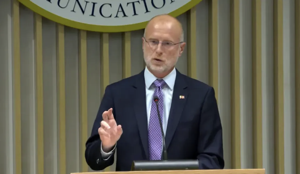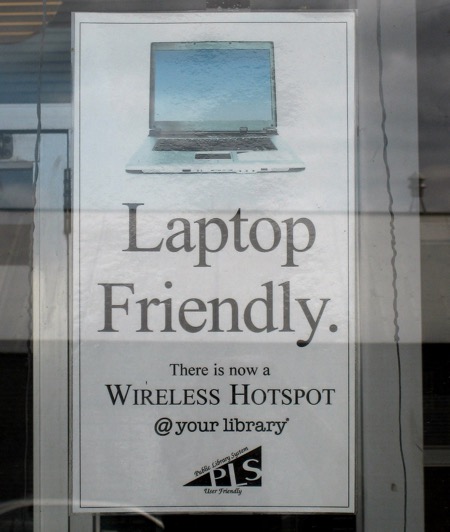
The Trump FCC has voted to kill two different programs that helped bring free Wi-Fi to school kids in underserved poor and rural U.S. communities.
It’s the latest casualty of an administration that has been taking a hatchet to FCC consumer protection and affordability initiatives, many of which were developed over decades – with popular bipartisan support.
The FCC under Brendan Carr on September 30 voted 2-1 to kill the programs, with Republican Olivia Trusty voting with Carr and Democrat Anna Gomez dissenting.
In 2023, the previous FCC expanded the agency’s Universal Service Fund's E-Rate program to help fund free Wi-Fi service on school buses. In 2024, the Biden FCC further expanded the program to help fund schools and libraries looking to lend out Wi-Fi hotspots and services that could be used off-premises by school kids that lacked affordable home broadband.
Both efforts were lauded for bridging the “homework gap,” making it easier and more affordable for kids in disconnected areas to keep up with homework. The expansions incurred no additional costs to taxpayers, leveraging existing USF funding. E-Rate spends about $2 billion annually and has a funding cap of roughly $5 billion.
Both Texas Senator Ted Cruz and FCC Chairman Brendan Carr spent most of 2025 trying to eliminate the programs. At one point, Cruz claimed, falsely, that the program was “censoring kids’ exposure to conservative viewpoints.” Carr, meanwhile, had tried to suggest the program created risks for kids due to unsupervised Internet use.

“Children are among the most impressionable members of our society. Parents have a right to decide when—and how—their kids access the Internet,” Carr said. “Wi-Fi on school buses removes both the supervision that helps keep kids safe and the parental control that protects them from harmful or inappropriate content."
Carr also claimed, without evidence, that the program was illegal.
"E-Rate funding is meant to enhance access to telecommunications services in classrooms and libraries,” Carr claimed. “A school bus is neither. We cannot simply reinterpret 'classrooms' to mean any place where learning might occur."
A far more likely reason for the Trump administration’s hostility to the programs is that large incumbent regional monopolies like AT&T don’t like the precedent set by the government offering free or discounted wireless broadband to underserved locals.
Customers getting free or discounted Wi-Fi from the government are customers that aren’t overpaying AT&T for patchy, sometimes sluggish cellular connectivity. AT&T has also long been accused – at times by its own employees – of defrauding school subsidy programs, and Carr has rarely stood up to the telecom giant on any policy issue of substance.

E-Rate “Attack” Generates Immense Backlash
The rollback of the popular initiatives harms consumers across partisan ideologies, from rural Trump-supporting veterans and farmers, to urban blue city marginalized and minority communities. It’s part of a much broader effort by the Trump FCC to effectively cull any FCC functions that don’t benefit the nation’s biggest telecom operators.
The FCC’s sole Democratic Commissioner, Anna Gomez, broadly criticized Carr’s decisions, noting that the programs were perfectly legal under the Universal Service law, which states the FCC may designate additional services for support as it sees fit.
“It would be incredibly naive for us to think that in our post-pandemic world, learning has returned to solely in-person and on paper,” Gomez said. “It is safe to say the landscape of communications technology has changed dramatically throughout the life of the E-rate program.”
Carr’s decision also drew the ire of numerous Senators and educational organizations.
The FCC "openly voted to snatch back the opportunity to offer more Americans, especially in rural areas, the high-speed Internet access to do the business of life online—pay bills, make telehealth appointments, fill out school applications—after the library closes," American Library Association President Sam Helmick said in a statement.
In New Mexico, the group noted, "Farmington Municipal Schools equipped its 90 buses with Wi-Fi, serving over 6,500 students daily.” In Ohio, "the Brown County Public Library's hotspot program allowed homeschool families to join virtual classes, entrepreneurs to run mobile businesses, and veterans to participate in telehealth appointments and certification testing," the ALA said.
“The FCC’s decision to repeal the E-Rate hotspots rule is a direct attack on our children’s future,” Massachusetts Senator Ed Markey said in a statement.
“This short-sighted move will rip Wi-Fi from the hands of students and educators who rely on library and school loan programs to get online."
Program Destruction Could Still Be Reversed
Carr’s unpopular destruction of the E-Rate expansion could still be reversed by future incarnations of the FCC.Kids on computer at library.

To that end, Texas Senator Ted Cruz has spent much of the year trying to eliminate the programs via the Congressional Review Act (CRA), which would not only roll back the program, but prevent the FCC from ever considering it again. It’s how Republicans thwarted the FCC from implementing popular broadband privacy rules back in 2017.
Cruz’s effort passed the Republican-controlled Senate back in May, but he’s struggled to gain momentum for passage in the House. Cruz has claimed, repeatedly and falsely, that the program created new and unique safety risks for schoolchildren.
Carr has also falsely claimed that the programs “heightened the risk of censoring kids’ exposure to conservative viewpoints,” despite absolutely no evidence.
The Cruz and Carr crusade against the supposed “illegal” dangers of the program appear to be a flimsy cover for an uglier truth: local, state, and federal government efforts to deliver better, faster broadband pose a direct risk to the monopoly logjam that dominates the U.S. broadband market with captured politicians keen to dutifully protect this broken state quo at all costs.
Header image of stop sign on side of school bus courtesy of Shutterstock/Leena Robinson, CC BY-NC 4.0, Attribution-NonCommercial 4.0 International
Inline image of FCC Chairman Brendan Carr courtesy of Broadband Breakfast
Inline image of wireless hotspot at library sign courtesy of the Nebraska Library Commission on Flickr, CC BY-NC-SA 2.0, Attribution-NonCommercial-ShareAlike 2.0 Generic
Inline image of students using library computers courtesy of Salt Lake City Public Library, CC BY-NC-SA 2.0, Attribution-NonCommercial-ShareAlike 2.0 Generic







